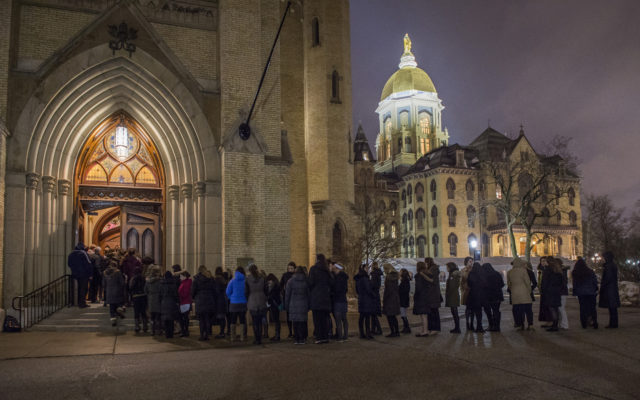Editor’s note: Last week, our Chancellor, Dr. Pia de Solenni, was in Rome to help facilitate a pilgrimage organized by the Notre Dame Center for Ethics and Culture. The students had the opportunity to meet synod fathers at three receptions during the week. At each reception, a student gave a reflection. The following was given at the last reception on Thursday, October 18.
In the American legal system, we swear in court to tell the truth, the whole truth, and nothing but the truth. It’s that middle tenet of the oath – the whole truth – that I think is noteworthy for the Church to consider. When truth is proclaimed partially or incompletely, it can be as misleading as a lie. I believe this kind of truth is what my friends, my peers, my classmates, and my fellow young men and women throughout the world are wanting to hear proclaimed wholeheartedly, courageously, and lovingly from the Church.
When I think of young people, my friends, and the Church, I’m struck by many of those who leave the Church, because they reject a false idea of what the Church actually is. They have not heard that “whole truth” of what Jesus Christ proclaimed, and what he asks of us, how he asks us to respond to His love; the whole truth that: the stories of our lives are always illuminated by light of supernatural grace, that are called to enter to struggle of radical holiness. We must be reminded that we are not called to success, to contentment, to mere toleration – we’re called to sainthood.
Any of my friends could tell you that Jesus taught love. But too many have no idea what this love consists of, what God’s Plan really is. Even many of those who attended Catholic primary and secondary schools had weak formation from parents, teachers, and parishes.
One of my best friends back on campus went through his whole confirmation process and high school religious education only ever hearing that “Jesus loves everyone,”– which surely is the beginning and end of the Christian mystery – but leaves everything in the middle – the heroic struggle – completely unexplored.
My roommate had a similar story in his Catholic high school. His understanding of the faith had little depth, and therefore little strength. When he came to Notre Dame, he began to finally receive instruction in his faith; he began reading the Bible for the first time, and C.S. Lewis.
These two friends of mine began encountering the tradition of the Church; both were greatly inspired by reading Augustine; they began participating in the sacramental life of the Church, attending Mass and confession regularly for the first time. They’re the ones who drag me to adoration.
What a great joy it has been to accompany them in their conversion.
They’ve now been given the whole picture, the whole truth, instead of a watered-down offer of comfort. It was something they were desiring so badly, but they didn’t know it because they weren’t receiving it. Of course, this transformation doesn’t mean they are now perfect (far from it!), but now they have entered the struggle – the journey back. They are trying.
As their friend and fellow young person, we’re in our fight together. There’s new life I witness in these friends when we share about our encounters with the Lord, about our encounters with the fullness of the truth and its inspiration from the beautiful and good.
At a moment in which a lot is said about ‘change and listening in the Church,’ I don’t think we young people are going to change Jesus Christ’s Church. Rather, we need Jesus Christ’s Church to be changing us, converting us, transforming us into saints. At the Mass, we recite the “Credo,” the “I believe,” not the “Cupio,” “I want.”
And lastly, though of course there should always be an “urgency” with respect to our salvation – as Peter perhaps overzealously jumped out of the boat to swim towards our Lord on the shore just to be near him – I think it is especially important for all of us, especially young persons, to be reminded that our Lord can play the long game.
On behalf of our young generation, I ask (you all) that the Church’s urgency never becomes a compromised urgency. Just last Sunday, we heard the Gospel telling us Jesus looked at the rich young man with love, but let Him walk away sad when he refused to respond to the call. The Gospel tells us that droves of his former disciples walked away grumbling after the Bread of Life sermon. Never did He run after them, offering to negotiate, or lessen the terms. Jesus doesn’t make settlements, He prosecutes for the win every time.
In the middle of Notre Dame’s campus, there is a statue of the Sacred Heart of Jesus that reads “Venite ad me Omnes” — “Come to me, all of you.” What He’s inviting us to the liberation that arises from the truth of knowing, loving, and serving His person. (Synod fathers,) please lead us not with any accommodation of the beautiful, good, and true — but with the real example of the joy and freedom of a friendship with He who is the beautiful, good, and true.
Please pray for us, that as the youth, we might not defer our life in the Church until we are grown, but that we might respond courageously to the time and place that the Lord has created us for.
John Paul Ferguson attends the University of Notre Dame, Class of 2020, Program of Liberal Studies & Theology Constitutional Studies Minor

